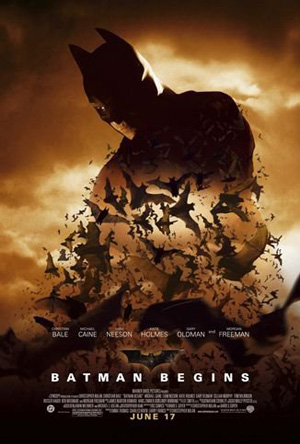 We’re on now to Part 2 of CHUD’s extensive Batman Begins coverage, folks. I hope you’re diggin’ so far. If not, yell at me right here.
We’re on now to Part 2 of CHUD’s extensive Batman Begins coverage, folks. I hope you’re diggin’ so far. If not, yell at me right here.
After chatting it up with both Michael Caine and Katie Holmes, we were granted the distinct pleasure of a short but VERY fun and entertaining back and forth with longtime favorites Morgan Freeman and Gary Oldman. Both men shined in their relatively small roles, but this interview actually had me wishing they had some screen time together as they seemed to display a real strong rapport with one another during the course of the roundtable.
Good stuff.
Q: Your company was trying to do Rendezvous with Rama, correct?
Freeman: We’re still trying to do Rendezvous with Rama (laughs). We’re struggling with that now, [and] hopefully we’re on the last draft of the script. Then, we’ll see.
Q: Have you seen Batman Begins?
Freeman: Yes, I saw it the night before last, and I was really knocked out.
Q: What was it like working with Christian Bale?
Freeman: Chris? Bale? Kind of a slimy character (Oldman laughs). Full of himself, you know, just, I don’t know why.
Oldman: Oh, you caught him on a good day, then (laughs).
Freeman: Oh, dear. You had to work actually with him, well, I guess we had the same amount of time.
Oldman: About the same amount of time, but only he’s in the mask, of course, when I work with him.
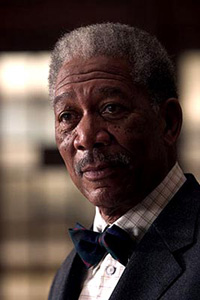 Freeman: Oh, well, he must have been totally insufferable then (laughs).
Freeman: Oh, well, he must have been totally insufferable then (laughs).
Oldman: At least you got him, he didn’t smell too good when I worked with him and he was in that suit.
Freeman: I understand that when he was in that suit, sweat would just drip off of him where they had to have holes in the gloves or something.
Oldman: He would stand and there was like…
Freeman: A puddle.
Oldman: A puddle where it was just coming through his shoes.
Freeman: He worked hard.
Oldman: He did work hard.
Q: Were you fans of the franchise, or the comic book, before getting involved?
Freeman: Uh, Gary was (Oldman laughs).
Oldman: You can quote me on that.
Q: Gary, did you have an accident, since you are using a cane?
Freeman: It’s an affectation. He told me, that’s what he said to me, it’s just an affectation.
Oldman: I’ve become, I wanted to become very actor-y (laughs).
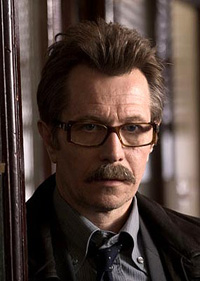 Q: Gary, this is a quieter role for you. How did you develop your character?
Q: Gary, this is a quieter role for you. How did you develop your character?
Oldman: It turned out like that. You know, I put it together in my kitchen, on the plane, [that] kind of thing. I learned the lines on the plane and got there and did the first scene and he said, "That’s okay. Do it like that." Like we said earlier, sometimes directors feel like they have to justify that hat that they are wearing they’ve got on as a director, and they come in and they tweak and interfere, you know what I mean? Sometimes directors, they are jailers of your talent. They close you up. And being a good director is knowing sometimes when not to say something.
Freeman: Knowing a lot when not to say anything…
Oldman: Knowing a lot, yeah, and Chris just lets you kind of, you know, and he had such a vision of what he, I guess, such an overview of what he wanted that if you were kind of going off a bit, he would kind of nudge you back, but he didn’t need to be busy.
Freeman: More like herding… "You are the actor, and I understand we already had our sit down, you explained your concept, your view," so I said, "Okay, I’m in your hands." That means that if you’ve got to nudge me a little bit to the right I move to the right, just from the pressure, weight, but you won’t have to touch me at all. You can come and go "Okay, you want me over here a little bit more," so no pressure on us at all that’s easy to do.
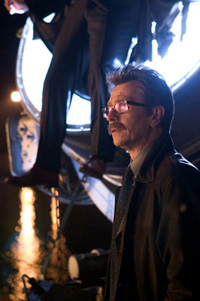 Q: What is your personal process in shaping these characters? How helpful were the comics in doing that?
Q: What is your personal process in shaping these characters? How helpful were the comics in doing that?
Freeman: Me first.
Oldman: Go ahead.
Freeman: I don’t have to do anything. The character is shaped on the page. All you have to do is lift it off, and I didn’t have to do anything at all, except decide whether you’re going to shave or not shave, comb your hair one way or another way. Someone’s going to put the clothes on you, and part of being an actor is wearing costumes. Costumes tell you an awful lot about who you are, so you just, it’s nothing. I think basically, get out of the way if you can, right? (to Oldman) That’s my answer.
Oldman: Well, I went and lived in Chicago for a year (laughs), and I studied at the police academy. No, the script is your map of the world, isn’t it? And if someone knows that if it’s well-written, you get all of the beats, it will tell you everything you need to know, and then Chris goes and hires Lindy Hemming, who’s a great costume designer, so you’re not there for four days, turning, saying "No, that doesn’t work, that doesn’t work." She’s got a great sense of how you might dress, so she offers up three jackets or a suit and you go, "You know what? I think I went with the first shirt and tie I think that I put on," and I went…
Freeman: This feels good…
Oldman: "We got it!"
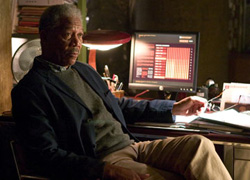 Q: Screenwriter David Goyer said his mandate was to make it real. How do you accomplish reciting lines of scientific dialogue?
Q: Screenwriter David Goyer said his mandate was to make it real. How do you accomplish reciting lines of scientific dialogue?
Freeman: How do you make that real? By learning it so that you don’t have to think about it when you say it. That’s all that’s about. A scientist sounds like a scientist because the things that come out of their mouth don’t stumble, that’s all. If they [said], "And the, um, a microwave, uh," you know, then you don’t sound right, but if you can just get it out without stumbling then you’re going to sound fine.
Q: Is working on a big commercial movie like this any different than serving in smaller efforts?
Freeman: Your job is always the same if it’s a juggernaut or if it’s just one of these little jewels of a film that’s gonna wind up at the Laemmle or something, so your job doesn’t change whatsoever… give it your best shot.